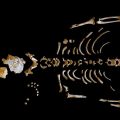Task force named to develop policy on human remains in te Smithsonian’s collections
What was once standard anthropological practice for the collection, study and display of human remains is no longer ethically responsible. The task force will promote respectful engagement with descendants and descendant communities and develop a Smithsonian-wide policy for the appropriate handling of human remains.

In 2022, the Smithsonian enacted a Shared Stewardship and Ethical Returns policy allowing shared stewardship arrangements for collections or the return of collections based on ethical considerations. At the same time, the Institution recognized that additional policies were needed for the human remains in its care. Accordingly, this new task force will develop guidelines on the ethical acquisition, care, use and disposition of human remains.
This task force will advance the Smithsonian’s ongoing work to address its collection of human remains. The National Museum of Natural History possesses 30,000 human remains from the 18th and early 19th centuries and has been gradually repatriating remains since 1989. The group will recommend a policy for the appropriate handling of human remains in the Smithsonian’s collection, including Native and non-Native remains and will promote respectful engagement with descendants and descendant communities.
The task force will hold its first meeting May 24. The task force members are:
- Ellen Stofan, co-chair, Smithsonian’s Under Secretary for Science and Research
- Kevin Gover, co-chair, Smithsonian’s Under Secretary for Museums and Culture
- Craig Blackwell, associate general counsel in the Smithsonian’s Office of the General Counsel
- Michael Blakey, Ph.D., professor of anthropology and American studies at the College of William & Mary
- Philip Deloria, professor of history at Harvard University
- Celia Emmelhainz, supervisory anthropologist, National Anthropological Archives and Human Studies Film Archives at the Smithsonian’s National Museum of Natural History
- Richard Kurin, Distinguished Scholar and Ambassador-at-Large at the Smithsonian
- Gabrielle Miller, program specialist and archaeologist at the Center for the Study of Global Slavery at the Smithsonian’s National Museum of African American History and Culture
- Rick Potts, chair of anthropology at the National Museum of Natural History
- David Resnik, Ph.D., bioethicist at the National Institutes of Health
- Marguerite Roby, photograph archivist at Smithsonian Libraries and Archives
- Sabrina Sholts, curator of biological anthropology at the National Museum of Natural History
- Reed Tuckson, M.D., managing director of Tuckson Health Connections
- Sally Yerkovich, Ph.D., director of educational exchange and special projects at The American-Scandinavian Foundation and adjunct professor at Columbia University
- Kevin Young, Andrew W. Mellon Director of the National Museum of African American History and Culture
“At the Smithsonian, we recognize certain collection practices of our past were unethical,” said Smithsonian Secretary Lonnie Bunch III. “What was once standard in the museum field is no longer acceptable. We acknowledge and apologize for the pain our historical practices have caused people, their families and their communities, and I look forward to the conversations this initiative will generate in helping us perform our cutting-edge research in a manner that is ripe with scholarship and conforms to the highest ethical standard.”
Posted: 16 May 2023







